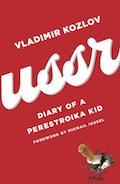The Curfew by Jesse Ball is short enough that I stopped only once while reading it—to wash the dishes. I washed the dishes slowly, carefully, making sure I wasn’t distracted, and I felt good about washing them. That’s what The Curfew is all about. Kind of.
It’s the story of a family. Molly is eight years old and mute. Her father William is a violinist who has been forbidden, along with the rest of the country, to play music. The woman of the house, Louisa, has been abducted by the government and presumably killed. Two parallel plots unfold: William attends a secret meeting where an unusual resistance movement is taking shape, and Molly collaborates on a puppet show with the downstairs neighbors.
The only police in The Curfew are secret police, who are impossible to tell apart from anyone else. Laws are spread erratically, by word of mouth. People are routinely chased, kidnapped, and murdered in the street for no discernible reason, leaving passersby unsure of how to respond. No one seems willing to acknowledge how badly things have gone wrong—least of all the narrator, who avoids taking a political stance as assiduously as the citizens do.
Ball’s writing is spare and often stunning. With its odd proverbs, anachronistic language, and strict manners, it resembles a sinister children’s fable.
A breeze was entering the room through the window and rushing about inside, giving small notice here and there. William would have smiled then, had he been the sort to smile. One envies those types—who do not smile. The rest of us go around like fools, and these few maintain such dignity! Let us never smile again.
In separate ways, Molly and William discover a possible strategy for transforming this society. William learns the tactics of the resistance—a kind of crowdsourced insurgency in which everyone fights a little bit, randomly and anonymously, so that no one can be singled out for punishment. Molly, through her puppet show, stages a cathartic re-imagining of her parents’ romance and Louisa’s disappearance. Both the insurgency and the puppet show require a faith in doing things small, doing them well, and seeking no reward other than a private satisfaction.
Ball seems to suggest that to overcome political and psychological repression we must take up a humble, vital craft (miming, vaudeville, masonry) and perform it well. Not coincidentally, Ball’s own writing is humble, vital, and well-performed. If the definition of experimental literature is that “its politics are its aesthetics and vice versa,” then The Curfew is a stirring example.
As the novel ends, the world of Molly’s imagination blends with the real dangers that William must face. Father and daughter become entwined in the elaborate play, and everything is brought to life by Ball’s deliberate prose. The writing, the puppetry, and the insurgency nest inside each other, echoing Ball’s belief in the revolutionary aspect of good craftsmanship. The Curfew becomes elegant proof of its own theory of resistance.
- Brian Hurley





What’s the difference between “spare” and “sparse” in terms of writing style?
This is a serious question.
Sort of.
I don’t know, but to me “spare” sounds like a deliberate emptiness, the result of careful restraint, whereas “sparse” sounds slightly negative, like a forest that’s been logged too much.
That sounds right as hell.
Damn, you know your words!
FYI — from this weekend’s review in the Sunday NY Times book section:
“With “The Curfew,” the poet and artist Jesse Ball delivers a SPARE masterwork of dystopian fiction, a fevered prose poem of society strangled by nefarious rule.” (emphasis mine)
http://www.nytimes.com/2011/08/28/books/review/the-curfew-by-jesse-ball-book-review.html
Ha! Awesome. We are so ahead of things.
For a different perspective, here’s a totally off-the-mark and unfair review of the same book.
http://lareviewofbooks.org/post/10681564615/nothing-to-say
“By now, dystopian fiction has been served up just about every way possible. To my knowledge, one of the few ways it hasn’t been attempted — or, at least, well executed — is in the realm of minimalism.”
So what about The Road? Does that count?
Exactly! This guy makes some basic assertions that are just bonkers.